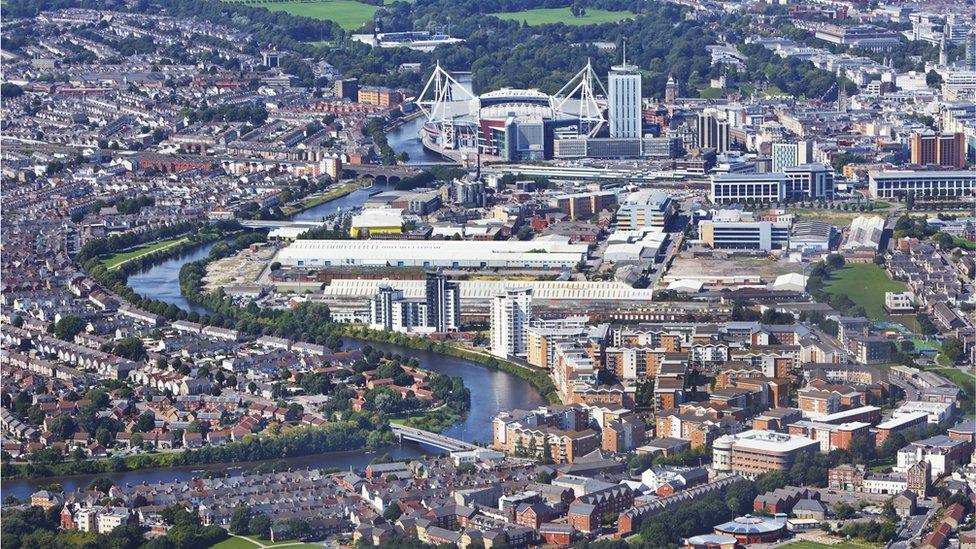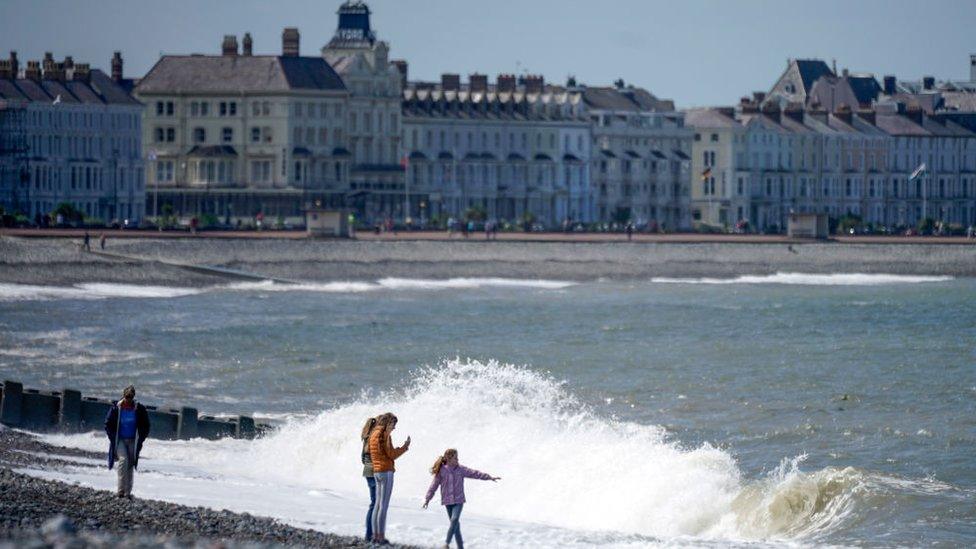Covid recovery: More new jobs in Gwynedd areas than Cardiff, report says
- Published
- comments

Will more people be working from home rather than in city centres such as Cardiff?
As Wales recovers from the pandemic, there are more new jobs in Gwynedd but fewer in Cardiff, a think tank says.
Research from the Resolution Foundation says the bounceback has been uneven across the UK.
Communities where work is reliant on tourism have seen the number of jobs increase in recent months.
In contrast, the numbers of people working in cities such as Cardiff continue to lag behind the pre-pandemic levels.
The report says not only are more people spending their holidays in the UK but many are still working from home and not making trips to work in bigger cities.
Initially during lockdown communities that depended on tourism and jobs in hospitality were the hardest hit.

Tourists have returned to Llandudno in the past couple of months following lockdown
They also tended to be lower-paid jobs.
"In the early part of the crisis, city centres and coastal areas were especially hard-hit because many jobs in such places depend on demand from people outside the area," said Resolution Foundation economist Charlie McCurdy.
"In Wales in particular, tourist hotspots such as Pembrokeshire and Gwynedd saw some of the highest furlough rates in the UK."
In those counties there is a high proportion of people working in hospitality, and with bars, cafes and hotels closed during lockdown and then not working to full capacity for many months, many people were furloughed or on reduced hours.
In June 2020, 316,000 people were furloughed in Wales, one-quarter of the Welsh workforce.

Wales was closed to tourists for some of the key months of 2020
But experience in cities has been different, according to the research.
It says city residents are not spending as much as they did before Covid and that is holding back recovery.
Quoting data from Google about how people move about, the report says in July trips to work in Cardiff, as well as Edinburgh, Belfast and London, were still down by one-third compared with before the pandemic.
In contrast people were shopping and going out more in holiday areas such as Gwynedd, Cornwall and Cumbria.
Mr McCurdy said: "Since Wales began to reopen in June, jobs in many tourism-reliant areas - and across Wales as a whole - have bounced back almost to pre-pandemic levels.
"The summer 'staycationing' boom has brought a much-needed boost to many."

With fewer opportunities to travel abroad, people are booking trips to Welsh locations, such as Gower
It seems British people have been keener to go on holiday than to start commuting to work again, he adds.
The report also argues the shift to more homeworking and less commuting could have a lasting impact on the pattern of employment across the UK.
There is a push from some quarters for more people to return to offices in city centres.
Whether that happens or not will have a direct impact on many other businesses that in the past benefited from people spending on their way to and from work, and in their lunch breaks.
Many employers have decided not to return to business as normal but to bring in hybrid working where employees only work from an office two or three times a week.
'Lasting impact'
That is likely to mean business in the many shops, cafes and bars around our city centres will continue to be reduced for the near future, the report says.
"A structural shift towards more home-working could have a lasting impact on the geography of the UK labour market, further hindering the living standards recovery for Wales' low-paid workers," Mr McCurdy added.
That could change the very nature of city centres like Cardiff which have in recent years been dominated by a mix of high-rise offices and places to spend, eat and play.


- Published9 August 2021

- Published8 June 2021

- Published31 May 2021
